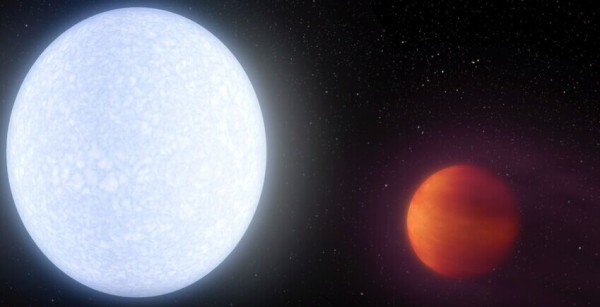By Angel Lee, | June 07, 2017

This Jupiter-Like Planet Can be the Hottest Alien Planet Ever Discovered! New Study Claims; Here’s Why
Following the discovery of the hottest known exoplanet, a team of international astronomers has found that the young giant planet is so hot it's likely that molecules break apart and atmosphere evaporates. Dubbed as KELT-9b, astronomers say that the exoplanet is known to zip around its hot host star once every 1.5 Earth days while its orbit is said to be so tight. In addition, it was found that the gas giant is tidally locked, always showing the same face to the star, similar to the moon and Earth.
Like Us on Facebook
The KELT-9b
Accordingly, the planet's discoverers revealed that temperatures on KELT-9b's "day side" reach a blazing 7,800 degrees Fahrenheit or 4,300 Celsius. That said, experts believe that given such extreme temperature basically makes the KELT-9b a truly otherworldly place citing water and carbon dioxide as elements that wouldn't be able to exist in the planet's atmosphere. Scott Gaudi, professor of astronomy at The Ohio State University, said that KELT-9b is a planet by any of the typical definitions based on mass, but its atmosphere is almost certainly unlike any other planet.
Furthermore, the researchers have also explained that KELT-9b is in fact, 2.8 times more massive than Jupiter but only half as dense. In the same statement of Gaudi, study co-leader Keivan Stassun, a professor of physics and astronomy at Vanderbilt University in Tennessee also said that KELT-9 radiates so much ultraviolet radiation that it may completely evaporate itself. It was found that the astronomers also aim to observe KELT-9b with other instruments. This includes NASA's Hubble and Spitzer space telescopes and the agency's $8.9 billion James Webb Space Telescope, which is reportedly scheduled to be launched in late 2018.
Will KELT-9b Last Long?
In one of his statements, Professor Gaudi adds that due to the intense heat from its host star which was allegedly seen to cause the planet to lose its atmosphere, he claims that the planet's future was not looking bright. He predicts that in about 300 million years, KELT-9b is most likely to be swallowed by its star as KELT-9 ran out of hydrogen and began to expand. Ultimately, Professor Gaudi highly emphasizes that KELT-9b would be further studied in the decades to come for them to identify whether there are variety of other worlds out there
-
Use of Coronavirus Pandemic Drones Raises Privacy Concerns: Drones Spread Fear, Local Officials Say

-
Coronavirus Hampers The Delivery Of Lockheed Martin F-35 Stealth Fighters For 2020

-
Instagram Speeds Up Plans to Add Account Memorialization Feature Due to COVID-19 Deaths

-
NASA: Perseverance Plans to Bring 'Mars Rock' to Earth in 2031

-
600 Dead And 3,000 In The Hospital as Iranians Believed Drinking High-Concentrations of Alcohol Can Cure The Coronavirus

-
600 Dead And 3,000 In The Hospital as Iranians Believed Drinking High-Concentrations of Alcohol Can Cure The Coronavirus

-
COVID-19: Doctors, Nurses Use Virtual Reality to Learn New Skills in Treating Coronavirus Patients










